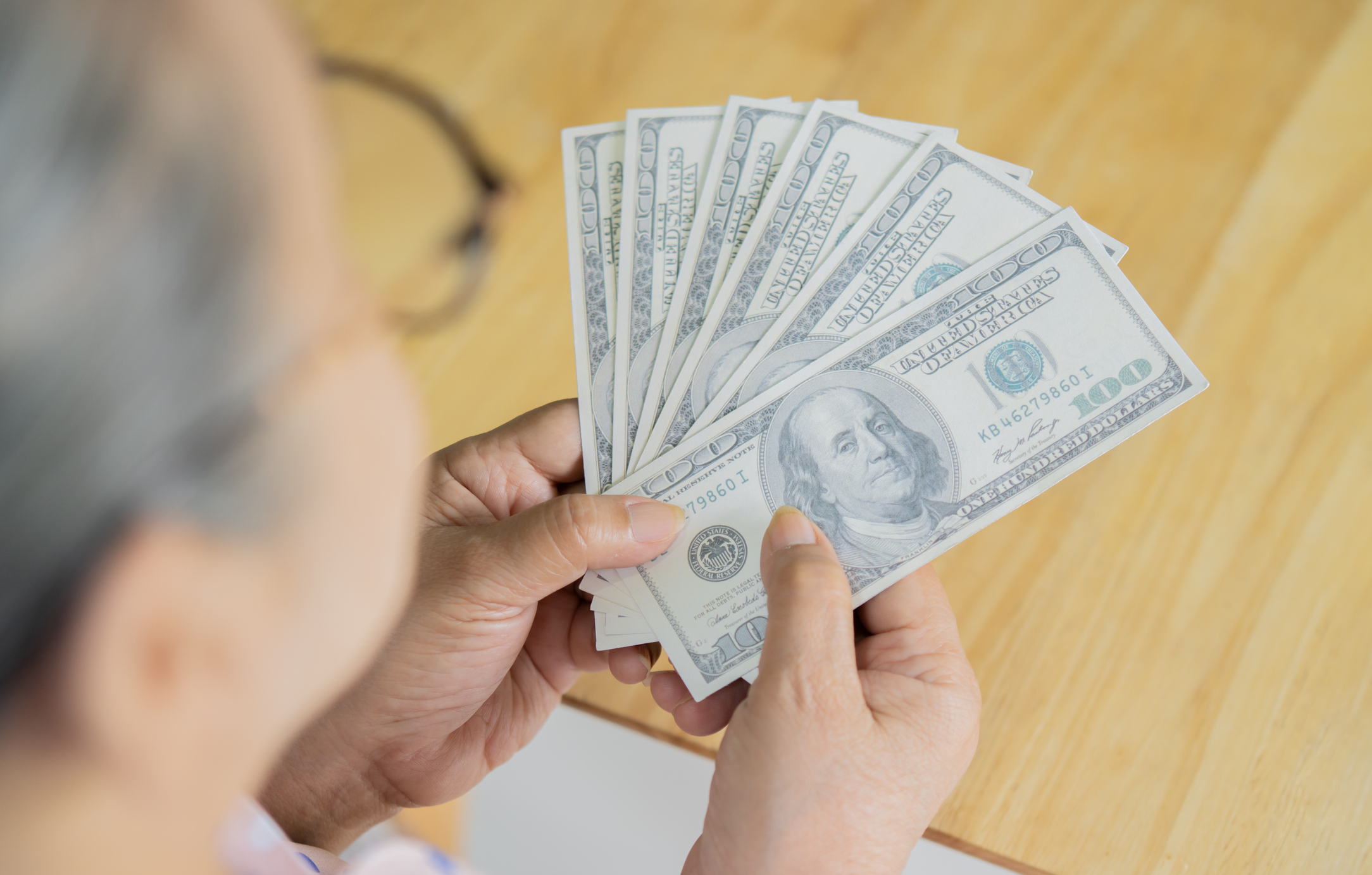I Inherited $50,000, and My Retirement is Fully Funded. Where's the Best Place to Store It for Maximum Growth?
These savings solutions can help you maximize returns without the risk.


Profit and prosper with the best of Kiplinger's advice on investing, taxes, retirement, personal finance and much more. Delivered daily. Enter your email in the box and click Sign Me Up.
You are now subscribed
Your newsletter sign-up was successful
Want to add more newsletters?

Delivered daily
Kiplinger Today
Profit and prosper with the best of Kiplinger's advice on investing, taxes, retirement, personal finance and much more delivered daily. Smart money moves start here.

Sent five days a week
Kiplinger A Step Ahead
Get practical help to make better financial decisions in your everyday life, from spending to savings on top deals.

Delivered daily
Kiplinger Closing Bell
Get today's biggest financial and investing headlines delivered to your inbox every day the U.S. stock market is open.

Sent twice a week
Kiplinger Adviser Intel
Financial pros across the country share best practices and fresh tactics to preserve and grow your wealth.

Delivered weekly
Kiplinger Tax Tips
Trim your federal and state tax bills with practical tax-planning and tax-cutting strategies.

Sent twice a week
Kiplinger Retirement Tips
Your twice-a-week guide to planning and enjoying a financially secure and richly rewarding retirement

Sent bimonthly.
Kiplinger Adviser Angle
Insights for advisers, wealth managers and other financial professionals.

Sent twice a week
Kiplinger Investing Weekly
Your twice-a-week roundup of promising stocks, funds, companies and industries you should consider, ones you should avoid, and why.

Sent weekly for six weeks
Kiplinger Invest for Retirement
Your step-by-step six-part series on how to invest for retirement, from devising a successful strategy to exactly which investments to choose.
Question: I recently found out I was receiving $50,000 from a family member. My retirement is already fully funded, I have no debt to pay off, and I don't need to use the $50,000 for anything immediate. Where are some smart places to store it to keep ahead of inflation?
Answer: My first suggestion would be to invest it in an index fund since they offer historically higher returns than savings accounts. However, if you're concerned about market volatility, there are a few other solutions that would work best for you.
Depending on your savings goals, a high-yield savings account or finding the best CD rates are smart options to consider for large deposits of $50,000 or more.
From just $107.88 $24.99 for Kiplinger Personal Finance
Become a smarter, better informed investor. Subscribe from just $107.88 $24.99, plus get up to 4 Special Issues

Sign up for Kiplinger’s Free Newsletters
Profit and prosper with the best of expert advice on investing, taxes, retirement, personal finance and more - straight to your e-mail.
Profit and prosper with the best of expert advice - straight to your e-mail.
Each approach helps you earn returns that outpace inflation while eliminating risk. I'll show you these scenarios to consider, depending on your investing or savings profile.
Scenario 1: I don't mind a little risk if there's a chance of a higher reward

I recommend investing in the stock market through an index fund, in the vehicle of an exchange-traded fund (ETF) or mutual fund, if you want high returns and are OK with some risk.
The advantage is diversification. If you choose an index fund that tracks the S&P 500, for example, that fund would hold the approximately 500 biggest U.S. stocks, rather than putting all your eggs in one company's basket. Index funds also have lower or no fees since they're passively managed.
There are a few considerations before diving in. First is that your return is not guaranteed. If the index performs poorly, your returns will decline, as well. As a point of reference, the S&P 500 has historically averaged about a 10% annual return.
The bigger concerns, though, revolve around timing. That 10% return is an average, meaning some years it's higher and some years it's lower or even negative. If you find yourself needing to use this money in a bad time for the market, you'll lose out on returns.
The other timing issue is the capital gains tax, which you'll have to pay on what you earned when you sell your holding: If you hold the index fund for less than a year before selling it, you'll be subject to short-term capital gains rates, which are higher.
Altogether, this means you should think carefully about whether you're OK with tying up this inheritance money for at least a year. If you're not sure, consider one of the other scenarios.
However, if you're willing to take some risk to maximize returns and are sure you'll hold the investment for more than a year, this would be a wise option.
Scenario 2: I want to park the cash and forget about it
If you're already on course to achieve your retirement goals, and you have a healthy amount in your emergency fund (at least six months of expenses), there's no reason to go with anything but a long-term CD.
While it's likely CDs won't earn you the same return as a low-risk ETF or other investment vehicle, they're lower-risk solutions for savers wanting to keep all their money. Now is the best time to lock one in, as rates are subject to change soon.
The Federal Reserve issued its second rate cut of the year at its meeting last week. Because it takes banks some time to adjust their rates, you can still find five-year CDs with rates higher than 4%.
Use this Bankrate tool to compare and find your best option quickly:
What happens if you need the cash before the CD matures? You'll pay a significant early withdrawal fee. On a five-year CD, your penalties could be anywhere from six months to one year of earned interest, equating to hundreds of dollars lost. Only do this approach if it works for your cash flow.
Recommended account. SchoolFirst Federal Credit Union has a five-year CD with a 4.15% APY. You'll make $11,272.61 in earned interest with a $50,000 deposit if you lock it in today.
Scenario 3: I want to earn a higher rate with cash flexibility

In an uncertain economy, it makes sense to prioritize flexibility. Inflation could continue to climb in 2026, and if the Fed continues to cut rates, eventually we'll reach the point at which you're not earning enough on your savings to stay ahead.
This is why I recommend a no-penalty CD. As its name implies, you'll have the flexibility to access your cash as you need it without the harsh fees. You'll need to keep your cash in for a week to a month at the start. You'll also want to pay attention to account terms, as some banks allow you to withdraw all of it after you reach the initial vesting period, while others allow one withdrawal per month.
The benefit of this approach is that you can earn a higher rate of return that'll outpace inflation. With terms between six months to a year, you'll have quick access back to your cash as well.
Recommended account. Climate First Bank offers a six-month no-penalty CD with a 4.34% APY, where you'll earn $1,073.48 in interest.
Scenario 4: I don't want to tie any money up

If you want access to your money at all times, a CD might not be the best fit. Instead, consider a high-yield savings account.
High-yield savings accounts differ from CDs in that they come with a variable interest rate. It means if the Fed decides to cut rates again, it could impact how much you can earn from one.
That said, now is an excellent time to sign up for one. I review rates weekly, and some accounts still have APYs far above 4%. Use this Bankrate tool to find the best savings account for you:
It's a great way to protect your $50,000 without having fees eat into it. Many of the best high-yield savings accounts come with no fees or account minimums. You can always sign up for a checking account to access funds quickly with a debit card, should you go with an online bank.
Recommended account. Newtek Bank offers the best rates at 4.35%, with no minimums or monthly fees. If you store $50,000 in it for a year without any rate cuts, you'd earn $2,222.86.
Ultimately, if you plan to receive a larger sum of money and have your retirement and emergency savings fully funded, these are the best options to consider. An index fund has the chance of the highest return but some risk, and of the guaranteed-return options, CDs will earn you the most over time as you can lock in rates while they're still higher.
However, it's also tempting to go with a high-yield savings account. While you run the risk of having rates lowered in the future, it also gives you flexibility to pivot to higher-earning investments if need be — or to spend the money when you decide to. Prioritizing your savings goals upfront can direct your path.
Related Content
Profit and prosper with the best of Kiplinger's advice on investing, taxes, retirement, personal finance and much more. Delivered daily. Enter your email in the box and click Sign Me Up.

Sean is a veteran personal finance writer, with over 10 years of experience. He's written finance guides on insurance, savings, travel and more for CNET, Bankrate and GOBankingRates.
-
 Nasdaq Leads a Rocky Risk-On Rally: Stock Market Today
Nasdaq Leads a Rocky Risk-On Rally: Stock Market TodayAnother worrying bout of late-session weakness couldn't take down the main equity indexes on Wednesday.
-
 Quiz: Do You Know How to Avoid the "Medigap Trap?"
Quiz: Do You Know How to Avoid the "Medigap Trap?"Quiz Test your basic knowledge of the "Medigap Trap" in our quick quiz.
-
 5 Top Tax-Efficient Mutual Funds for Smarter Investing
5 Top Tax-Efficient Mutual Funds for Smarter InvestingMutual funds are many things, but "tax-friendly" usually isn't one of them. These are the exceptions.
-
 One of the Most Powerful Wealth-Building Moves a Woman Can Make: A Midcareer Pivot
One of the Most Powerful Wealth-Building Moves a Woman Can Make: A Midcareer PivotIf it feels like you can't sustain what you're doing for the next 20 years, it's time for an honest look at what's draining you and what energizes you.
-
 I'm a Wealth Adviser Obsessed With Mahjong: Here Are 8 Ways It Can Teach Us How to Manage Our Money
I'm a Wealth Adviser Obsessed With Mahjong: Here Are 8 Ways It Can Teach Us How to Manage Our MoneyThis increasingly popular Chinese game can teach us not only how to help manage our money but also how important it is to connect with other people.
-
 Looking for a Financial Book That Won't Put Your Young Adult to Sleep? This One Makes 'Cents'
Looking for a Financial Book That Won't Put Your Young Adult to Sleep? This One Makes 'Cents'"Wealth Your Way" by Cosmo DeStefano offers a highly accessible guide for young adults and their parents on building wealth through simple, consistent habits.
-
 My Spouse and I Are Saving Money for a Down Payment on a House. Which Savings Account is the Best Way to Reach Our Goal?
My Spouse and I Are Saving Money for a Down Payment on a House. Which Savings Account is the Best Way to Reach Our Goal?Learn how timing matters when it comes to choosing the right account.
-
 We're 78 and Want to Use Our 2026 RMD to Treat Our Kids and Grandkids to a Vacation. How Should We Approach This?
We're 78 and Want to Use Our 2026 RMD to Treat Our Kids and Grandkids to a Vacation. How Should We Approach This?An extended family vacation can be a fun and bonding experience if planned well. Here are tips from travel experts.
-
 My First $1 Million: Retired From Real Estate, 75, San Francisco
My First $1 Million: Retired From Real Estate, 75, San FranciscoEver wonder how someone who's made a million dollars or more did it? Kiplinger's My First $1 Million series uncovers the answers.
-
 To Love, Honor and Make Financial Decisions as Equal Partners
To Love, Honor and Make Financial Decisions as Equal PartnersEnsuring both partners are engaged in financial decisions isn't just about fairness — it's a risk-management strategy that protects against costly crises.
-
 Top 5 Career Lessons From the 2026 Winter Olympics (So Far)
Top 5 Career Lessons From the 2026 Winter Olympics (So Far)Five lessons to learn from the 2026 Winter Olympics for your career and finances.